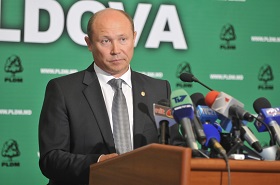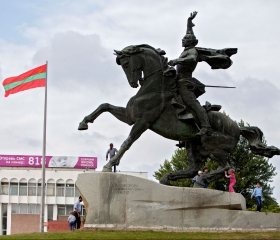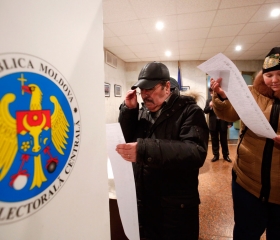As far as attention is concerned, in 2014-2015 the Ukrainian crisis has overshadowed many other critical events in the post-Soviet space. Nevertheless, the events in Moldova have kept analysts glued to the country, not only in the context of Ukraine and Transnistria but also because of the country’s dramatic domestic politics.
Oligarchs Bound for Europe
Until recently, Moldova was seen as the frontrunner in the race to the European Union, among other things within the Eastern Partnership program, having demonstrated the top results in the integration contest. In fact, Chisinau was the first country to be granted a visa-free regime – a major achievement in its quest for Europe [1].
At the same time, Moldova has clearly demonstrated how poorly the Eastern Partnership and other EU cooperation programs for the former Soviet Union have been adapted to the countries’ specific characteristics, political systems and elite behavior. This example has become extremely spectacular, since the Moldovan establishment has been unable to develop its country even with substantial foreign assistance.
Moldova is well known for its form of oligarchic capitalism, which has merged with the government, and for the oligarchs who regard the country as their patrimonial lands but cannot implement the declared drive toward Europe. The political system is dominated by oligarchs and crime, with the lead role played by Vlad Plakhotnyuk, a leader of the Democratic Party of Moldova.
Moldovan Economy: the Emerging Crisis and the Robbery of the Century
Formed in February 2015, the government of Kirill Gaburich has been the weakest even by Moldova standards. His parliamentary approval was possible only thanks to a compromise with the Communist Party of Moldova that once again agreed to cooperate with the liberals and democrats.
Notably, the government came to power with relatively decent economic figures, since in 2014 the industrial output grew by seven percent and agriculture by eight percent. However, the government was dazed by its success and failed to adopt serious anti-crisis measures obviously required because of Russian restrictions that reduced the level of Moldovan exports to Russia by one third. The Moldovan leu followed the ruble drop, causing a price hike. Then came a reduction in monetary and expendable incomes, as well as in consumer spending, which led to a contraction of domestic demand. The population was also affected by the weaker ruble and the subsequent major decrease in cash transfers from Moldovans working in Russia. Because of this, migrants supply 23 percent of Moldova’s budget.
These current developments do not bode well for Moldova’s economic growth. On the contrary, the economy will fall by 1-2 percent, while social tensions will aggravate due to the weakened leu and higher tariffs.
The resignation of the Gaburich government coincided with the nation-wide financial crisis caused by the disinvestments of Banca de Economii, Banca Sociala and Unibank which are united in the BEM group, of a sum of one billion dollars because of bad loans. On the day of Mr. Gaburich’s departure, the National Bank also imposed special oversight on three more major banks, i.e. Moldova Agroindbank, Moldindconbank and Victoriabank.
The robbery of the century has in fact shattered Moldova, which has been left deprived of external credits, World Bank financing and a visit from an IMF delegation which was planning to discuss grants.
As the National Anticorruption Center discovered, the BEM group was managed by millionaire Ilan Shor, husband of popular singer Jasmine, and had been making loans not only to absolutely unknown applicants but even outright bums. As a result of interbank credits of the Banca de Economii – Banca Sociala, collaterals and investment abroad, the amount stolen was at least one billion dollars. In order to close the gap, the government of Iurie Leancă (2013-2015) adopted a secret executive order to allow the National Bank to lend these three banks 9.5 billion leu, i.e. about USD 500 million, which also vanished.
The U.S. auditors Kroll investigated the theft and unveiled the names of many top politicians. However, Ilan Shor, former Chairman of Administrative Council of Banca de Economii, has been just elected mayor of the city of Orhei, which hardly protects him from all of these threats. At the same time, an unbiased investigation is also unlikely, because the connections lead up to the top echelon, while the overall domestic environment is reliably permeated with theft and corruption.
New Government and Local Elections
The one billion dollars that were stolen constitute one eighth of national GDP and have grossly tarnished Moldova’s image. Moreover, the West will not extend financial aid until Chisinau liquidates the problematic banks and makes marked progress in conquering corruption. The government will very likely close these banks and allow the West to expand its oversight, because otherwise vital foreign loans will never arrive. The Moldovan leaders cannot hope that the West will always turn a blind eye to their activities in return for geopolitical loyalty in the confrontation with Moscow. In this case, finance and politics are of course related but move apart in principle. Next arrived the government of Valeriu Strelet, basically unknown to the public but hardly a novice in politics in comparison with Mr. Gaburich. The latter is a beginner, his first post being the premiership, only underlining the specifics of Moldovan politics, whereas Mr. Strelet is an educated historian, a businessman and former operative of the Liberal Democratic Party of Moldova, whose accession resulted from exciting maneuvering by top national politicians and power wielders.
No doubt, the construction of the new pro-European coalition has been inspired by Mr. Plakhotnyuk who was insistent and applied much pressure to prevent leader of Liberal Democratic Party Vlad Filat from becoming prime minister. After his relatives were arrested, Mr. Filat wrote on social media that he regarded the action “in direct connection with the emergence of the ruling alliance,” while ex-premier Ion Sturza qualified “the detention of certain close relatives of politicians in the midst of negotiations as an unprecedented form of psychological intimidation.” The pressure clearly indicated that Mr. Filat’s feeble attempt to become prime minister was something absolutely contrary to the plans of Mr. Plakhotnuyuk who temporarily left parliament but remained a powerful kingmaker.
The coalition also rejected former Minister of Education Maia Sandu, whose rhetoric proved that she has retained her ambitions, as was the case during her ministerial tenure, and would not remain a puppet, at the same time sticking to the coalition’s overall policies. However, the extravagant leader Mihai Ghimpu from the Liberals (obviously at the instigation of Mr. Plakhotnyuk) stonewalled Miss Sandu, declaring she was not the one to set the rules.
As a result of an extended search for a proper candidate, the coalition selected Mr. Strelet, a rather unknown politician and businessman, who cannot be seen as an independent figure. On the contrary, he appears to be the least charismatic leader who will fully obey the alliance.
The government is not likely to rule for long, although the nonstop reshuffling amidst the huge thefts and grave confrontation between Russia and the West seems fraught with serious risks. Hence, the government should be amenable vis-à-vis the World Bank and the IMF and accept their terms, staying in office at least up to end of this year which could see fresh parliamentary elections that are frequently requested by the Socialists.
At the same time, despite their appeals to hold new elections, this June, the Party of Socialists of Republic of Moldova lost the local elections, indicating that criticism of the pro-European policies and at least vocally pro-European parties does not imply the electorate’s full support of the pro-Russian stance. The situation should not be seen as one-dimensional within the Europe-Russia dilemma. Some nuances are critically important and should be incorporated in order to prevent erroneous perceptions specific to assessing the Ukrainian pro-Russian forces during the government of Viktor Yanukovich. Close contacts of Socialist leader Igor Dodon with Russian authorities before the parliamentary elections in 2014 did help the Socialists who were seen as a pro-Russian party to replace the Communists who have recently become partnering with pro-European parties.
Nevertheless, the Socialists were hardly a success at the local elections that took place six months later. Of course, winning on the national and local levels cannot be seen as equal achievements. The latter would not reflect the geopolitical preferences of voters, sometimes subconscious and unformulated, i.e. pro or against Russia or the West, but rather mean voting for candidates. Still, the Socialists’ failure has placed their future under question. Amidst their flop in Chisinau, the Liberal Democrats and Democrats won a landslide in other places, with the former winning in 13 and the latter in 11 regions. At the same time, the Socialists overwhelmed in four, Our Party in two and Communists and Mr. Leancă’s party in one region each. Quite successful was Our Party led by Andrei Usatîi, who became mayor of Beltsy, Moldova’s second largest city known for its traditionally strong opposition sentiments, although Mr. Usatii preferred to refrain from outward support either for the EU or the EEU during his campaign.
The most competitive race was definitely in Chisinau, with Vice Chairman of the unionist Liberal Party Dorin Chirtoacă and Socialist Zinaida Greceanîi running for mayor. The lady lost, but the Chisinau Council will retain the same equilibrium, with the unionist Liberals still quite popular.
Domestic and External Prospects
As a result, Moldova remains divided into two roughly equal parts, one of them willing to preserve balance between Russia and the West, economic and political cooperation with Moscow and social policies, and the other eager to grow closer to the West, with intellectuals and capital residents supporting unionism.
Moldova’s landscape remains wobbly, making possible more government crises and parliamentary elections that could be affected by new political projects, which have been dynamically unfolding as of late. One of them belongs to Mr. Leancă’s party and is aimed at improving its pro-European image and competing with the traditional forces. So far, it is hard to say how effective the new structure will become and how it might rival the ruling coalition. According to some experts, the initiative belongs to Mr. Plakhotnyuk who seeks a replacement for the Democrats. But Mr. Leancă’s reputation has been seriously damaged by the banking affair. Had he refused to sign the decision on the BEM group, his image would have been much brighter. But in the absence of an alternative, the project put forward by his Peoples’ European party may cause some intrigue. Support from Mr. Plakhotnyuk and the West will definitely help Mr. Leancă and harm Mr. Filat and his party.
As for the link between the new government and relations with Russia, a breakthrough appears unlikely. Lately, despite obvious aggravations between Moscow and Chisinau on the issues of Ukraine and Transnistria, a positive trend seems to have emerged, as seen from the Moscow meeting of Mr. Gaburich and Prime Minister Dmitry Medvedev who discussed the reanimation of the intergovernmental commission, as well as talks between Vice Premier Dmitry Rogozin Moldovan and Vice Premier Victor Osipov who agreed that Russia would open its market to Moldovan goods in exchange for a rotation of Russian peacemakers and the delivery of their supplies through Moldovan territory. However, despite the possible resumption of the commissions, a probable agreement on supplies for the Russian contingent, and the removal of trade restrictions, these moves are purely tactical.
Chisinau will apparently keep coordinating its steps with Kiev, while Mr. Strelet’s new statements are not very optimistic. Entering the post, the prime minister spoke about a reset with Russia, whereas in an interview with Romanian newspaper Adevarul he focused on counter sanctions against Russia and the risks related to the Transnistria settlement. Hence, a positive breakthrough is hardly plausible, with certain tactical moves likely to remove excessive bilateral tensions, which might still help economically constricted Transnistria. However, both these probabilities and the discussion of ways to reassemble a single state with broad rights for Transnistria will largely hinge on the Russia-West relationship, to a great extent in the Ukrainian context.
1. By Extending Visa-Free Regime, EU Recognizes Moldovan Efforts.







